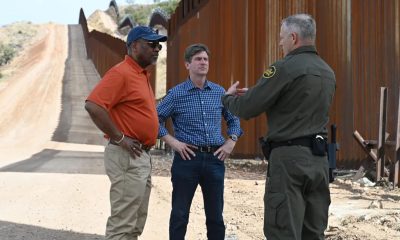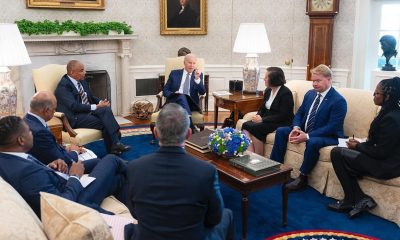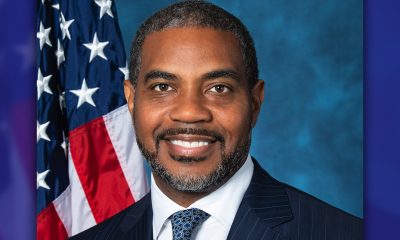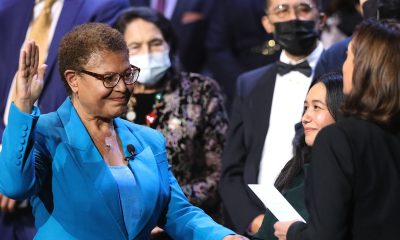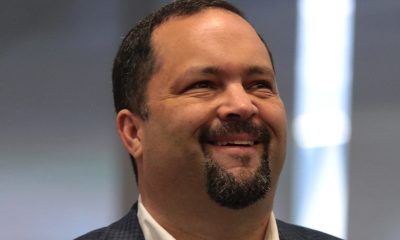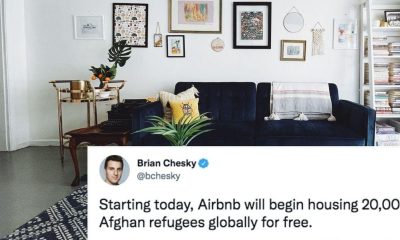World
Malaysia Turns Away 800 Boat People; Thailand Spots 3rd Boat

An ethnic Rohingya woman carries her baby as she answers questions from UNHCR workers at a temporary shelter in Lapang, Aceh province, Indonesia, Thursday, May 14, 2015. More than 1,600 migrants and refugees from Myanmar and Bangladesh have landed on the shores of Malaysia and Indonesia in the past week and thousands more are believed to have been abandoned at sea, floating on boats with little or no food after traffickers literally jumped ship fearing a crackdown. (AP Photo/Binsar Bakkara)
Eileen Ng and Thanyarat Doksone, ASSOCIATED PRESS
LANGKAWI, Malaysia (AP) — Rohingya and Bangladeshis abandoned at sea by traffickers had nowhere to go Thursday as Malaysia turned away two crammed migrant boats and Thailand kept at bay a large vessel with hundreds of hungry people.
“What do you expect us to do?” Malaysian Deputy Home Minister Wan Junaidi Jafaar said. “We have been very nice to the people who broke into our border. We have treated them humanely but they cannot be flooding our shores like this.”
“We have to send the right message that they are not welcome here,” he told The Associated Press. Four days earlier, about 1,000 refugees landed on the shores of Langkawi, a resort island in northern Malaysia near Thailand. Another 600 have arrived surreptitiously in Indonesia.
Thai Prime Minister Gen. Prayuth Chan-ocha also made it clear that his government does not have resources to host refugees.
“If we take them all in, then anyone who wants to come will come freely. I am asking if Thailand will be able to take care of them all. Where will the budget come from?” Prayuth said. “No one wants them. Everyone wants a transit country like us to take responsibility. Is it fair?” he said.
Southeast Asia for years tried to quietly ignore the plight of Myanmar’s 1.3 million Rohingya but finds itself caught in a spiraling humanitarian crisis that in many ways it helped create. In the last three years, more than 120,000 members of the Muslim minority, who are intensely persecuted in Buddhist-majority Myanmar, have boarded ships to flee to other countries, paying huge sums to human traffickers.
But faced with a regional crackdown, the smugglers have abandoned the ships, leaving an estimated 6,000 refugees to fend for themselves, according to reliable aid workers and human rights groups.
“This is a grave humanitarian crisis demanding an immediate response,” said Matthew Smith, executive director of nonprofit human rights group Fortify Rights. “Lives are on the line.”
Despite appeals by the U.N. and aid groups, no government in the region — Thai, Indonesian or Malaysian — appears willing to take the refugees, fearing that accepting a few would result in an unstoppable flow of poor, uneducated migrants.
U.N. Secretary-General Ban Ki-moon is “alarmed by reports that some countries may be refusing entry to boats carrying refugees and migrants,” a statement from his office said Thursday. It said Ban urged governments in the region to “facilitate timely disembarkation and keep their borders and ports open in order to help the vulnerable people who are in need.”
Wan Junaidi said about 500 people on a boat found Wednesday off northern Penang state were given provisions and sent on their way. Another boat carrying about 300 migrants was turned away near Langkawi island overnight, according to two Malaysian officials who declined to be identified because they weren’t authorized to speak to the press.
Meanwhile, a boat carrying 300 Rohingya was spotted at the Thai-Malaysian maritime border in Satun province, Thailand’s deputy government spokesman Maj. Gen. Sansern Kaewkamnerd said.
The Thai navy contacted the migrants, who said they “wanted to travel to a third country and asked for help in repairing their boat and asked for food and water,” Sansern said.
“None of them wanted to go to the Thai shore but wanted to travel to a third country,” he said. “Thai sailors have given them what they wanted by providing food and water for them. Currently, they are in the process of repairing the broken engine.” The repairs will finish tonight, he said.
Malaysia, which is not a signatory of international conventions on refugees, is host to more than 150,000 refugees and asylum seekers, the majority of whom are from Myanmar. More than 45,000 of them are Rohingya, according to the U.N. refugee agency, many more than almost any other country.
But because they have no legal status, job opportunities are limited. They also have little or no access to basic services like education and health care, and are vulnerable to arrests and deportation. A small number are resettled to third countries.
Phil Robertson of Human Rights Watch Asia accused Indonesia, Thailand and Malaysia of playing “a three-way game of human ping pong.” At the same time, the three countries and others in Southeast Asia have for years bowed to the wishes of Myanmar at regional conferences, avoiding all discussions of state-sponsored discrimination against the Rohingya.
Denied citizenship by national law, members of the Rohingya minority are effectively stateless. They have limited access to education or adequate health care and cannot move around freely. They have been attacked by the military and chased from their homes and land by extremist Buddhist mobs in a country that regards them as illegal settlers.
Wan Junaidi, the deputy home minister, said it was time to put pressure on Myanmar to address the Rohingya crisis.
“You talk about democracy, but don’t treat your citizens like trash, like criminals, until they need to run away to our country,” he said.
Increasingly over the years, Rohingya boarding boats in the Bay of Bengal have been joined by Bangladeshis seeking an escape from poverty.
Their first stop until recently was Thailand, where migrants were held in jungle camps until their families could raise hefty ransoms so they could continue onward. The smugglers changed tactics after recent crackdowns and began holding people on large ships offshore.
Initially migrants were shuttled to shore in groups on smaller boats after their “ransoms” were paid. But as agents and brokers on land got spooked by arrests — not just of traffickers but also police and politicians — they went into hiding.
That created a bottleneck, with migrants stuck on boats for days and weeks.
___
Doksone reported from Bangkok, Thailand. Associated Press journalists Robin McDowell in Yangon, Myanmar and Ali Kotarumalos in Jakarta, Indonesia contributed to this report.
Copyright 2015 The Associated Press. All rights reserved. This material may not be published, broadcast, rewritten or redistributed.
###
Barbara Lee
Congresswoman Barbara Lee Issues Statement on Deaths of Humanitarian Aid Volunteers in Gaza
On April 2, a day after an Israeli airstrike erroneously killed seven employees of World Central Kitchen (WCK), a humanitarian organization delivering aid in the Gaza Strip, a statement was release by Rep. Barbara Lee (D-CA-12). “This is a devastating and avoidable tragedy. My prayers go to the families and loved ones of the selfless members of the World Central Kitchen team whose lives were lost,” said Lee.

By California Black Media
On April 2, a day after an Israeli airstrike erroneously killed seven employees of World Central Kitchen (WCK), a humanitarian organization delivering aid in the Gaza Strip, a statement was release by Rep. Barbara Lee (D-CA-12).
“This is a devastating and avoidable tragedy. My prayers go to the families and loved ones of the selfless members of the World Central Kitchen team whose lives were lost,” said Lee.
The same day, it was confirmed by the organization that the humanitarian aid volunteers were killed in a strike carried out by Israel Defense Forces (IDF). Prior to the incident, members of the team had been travelling in two armored vehicles marked with the WCF logo and they had been coordinating their movements with the IDF. The group had successfully delivered 10 tons of humanitarian food in a deconflicted zone when its convoy was struck.
“This is not only an attack against WCK. This is an attack on humanitarian organizations showing up in the direst situations where food is being used as a weapon of war. This is unforgivable,” said Erin Gore, chief executive officer of World Central Kitchen.
The seven victims included a U.S. citizen as well as others from Australia, Poland, the United Kingdom, Canada, and Palestine.
Lee has been a vocal advocate for a ceasefire in Gaza and has supported actions by President Joe Biden to airdrop humanitarian aid in the area.
“Far too many civilians have lost their lives as a result of Benjamin Netanyahu’s reprehensible military offensive. The U.S. must join with our allies and demand an immediate, permanent ceasefire – it’s long overdue,” Lee said.
Bay Area
Nigerian Bank Chief Killed in Helicopter Crash on Way to Superbowl XVIII
According to the San Bernardino County Sheriff’s Dept., the crash occurred near Nipton, on the edge of the Mojave Desert Preserve. The poor weather conditions — rain, wind and snow showers—may have contributed to the accident, although the investigation is not complete. All six aboard were killed. Herbert Wigwe, 57, founded Access Bank in 1989, and it became the country’s largest competitor, Diamond Bank in 2018.
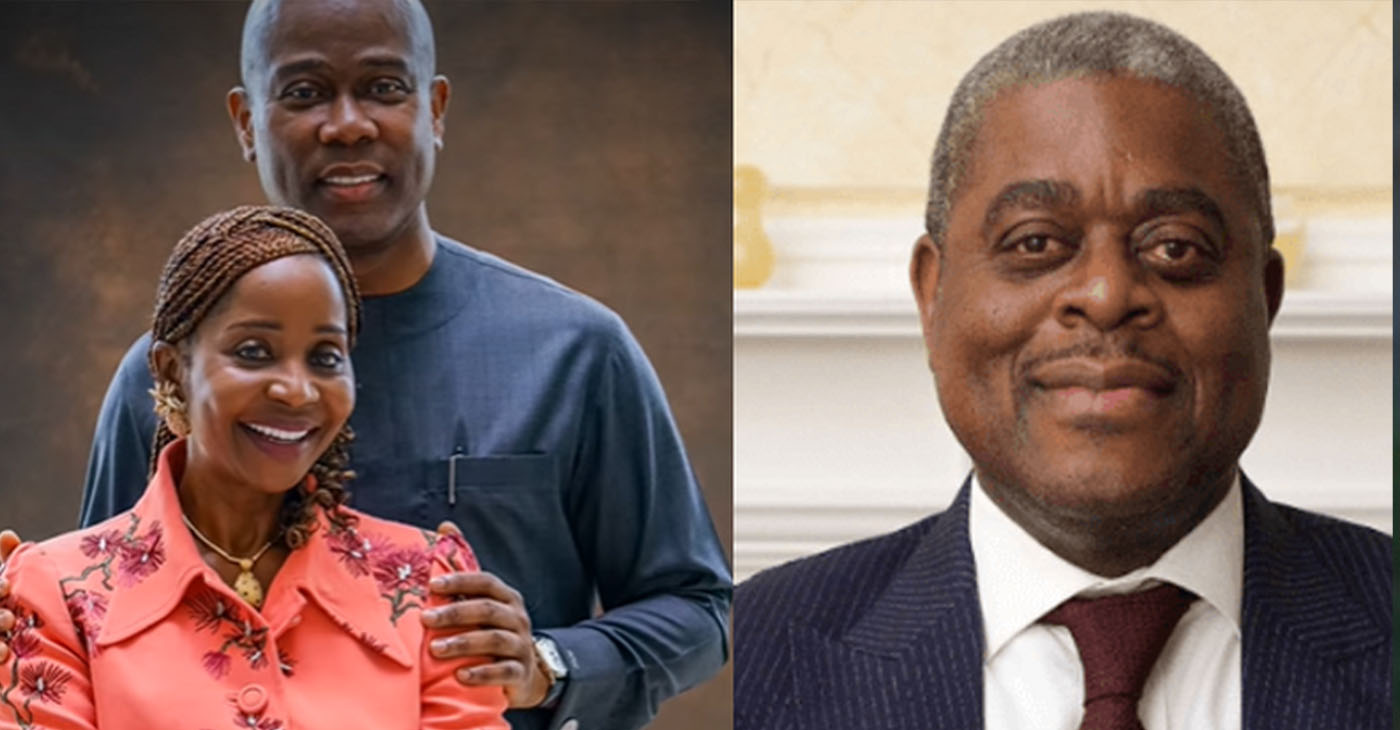
By Post Staff
The co-founder of one of Nigeria’s largest banks died with his wife, son and three others when the helicopter transporting them from Palm Springs, Ca., to Boulder City, Nev. to attend the fifty-eighth SuperBowl at the stadium outside Las Vegas crashed on Feb. 9.
According to the San Bernardino County Sheriff’s Dept., the crash occurred near Nipton, on the edge of the Mojave Desert Preserve. The poor weather conditions — rain, wind and snow showers—may have contributed to the accident, although the investigation is not complete. All six aboard were killed
Herbert Wigwe, 57, founded Access Bank in 1989, and it became the country’s largest competitor, Diamond Bank in 2018.
More recently, Wigwe was planning to open a banking service in Asia this year after making successful expansions to other parts of Africa, including South Africa, Kenya, and Botswana.
Nigerian President Bola Tinubu described Wigwe’s death as an ‘overwhelming tragedy.”
Oakland resident and Nigerian immigrant Kayode Gbadebo agrees with Tinubu. He met Wigwe in Nigeria but crossed paths with him in London in 2006. Wigwe, he said, “took risks.”
He was young and people thought he couldn’t do what he intended, which was not so much about money but community.
“He was more like Jesus in washing the feet of the poor– Wigwe was culturizing community,” Gbadebo said.
“There will never be another like him. This is a deep, deep loss” and he hopes everyone will eventually “be comforted.”
He was also disappointed that a replacement has already been named even before Wigwe is buried. “It is not reasonable. You don’t want a vacuum, but it’s” not fair to the family, Gbadebo observed.
Wigwe had also been working to solve the migration issues from African countries, believing that “investing in higher education was key to controlling mass migration, which “is destabilising countries across the world,” BBC News reported.
“We need to take a holistic approach to address global migration, starting with our traditional framework for international development,” Wigwe wrote.
To that end, according to BBC News, Wigwe was preparing to open Wigwe University in Niger, where he was from.
“The best place to limit migration is not in the middle of the Mediterranean or the English Channel or the Rio Grande. It is in the home countries that so many migrants are so desperate to leave,” he wrote, saying his university was an opportunity for him “to give back to society.”
Besides Wigwe and his wife, Chizoba Nwuba Wigwe, and one son, two crew members and Bimbo Ogunbanjo, former group chairman of the Nigerian Exchange Group Plc, were also killed in the crash.
According to Wikipedia, three other children survive Wigwe.
In his statement reported in People magazine, Tinubu described Wigwe as “a distinguished banker, humanitarian, and entrepreneur.”
“I pray for the peaceful repose of the departed and ask God Almighty to comfort the multitude of Nigerians who are grieving and the families of the deceased at this deeply agonizing moment,” the president said.
He added, “Their passing is an overwhelming tragedy that is shocking beyond comprehension.”
Besides feeling the tremendous loss, Gbadebo fears the disorder and greed that will follow. “It’s a mess,” he said.
People magazine, BBC News and Wikipedia were the sources for this report.
Activism
No Valid Reason for Failing to Condemn Hamas’ Act of Terrorism
On Oct. 7, 2023, Hamas terrorists crossed the Israel-Gaza border and indiscriminately slaughtered Israeli civilians in their homes. They killed nearly 300 young people at a music festival and took at least 200 hostages including 30 children. The atrocities they committed included massacres of families, abduction of the elderly and children, burning of babies and rapes of women.
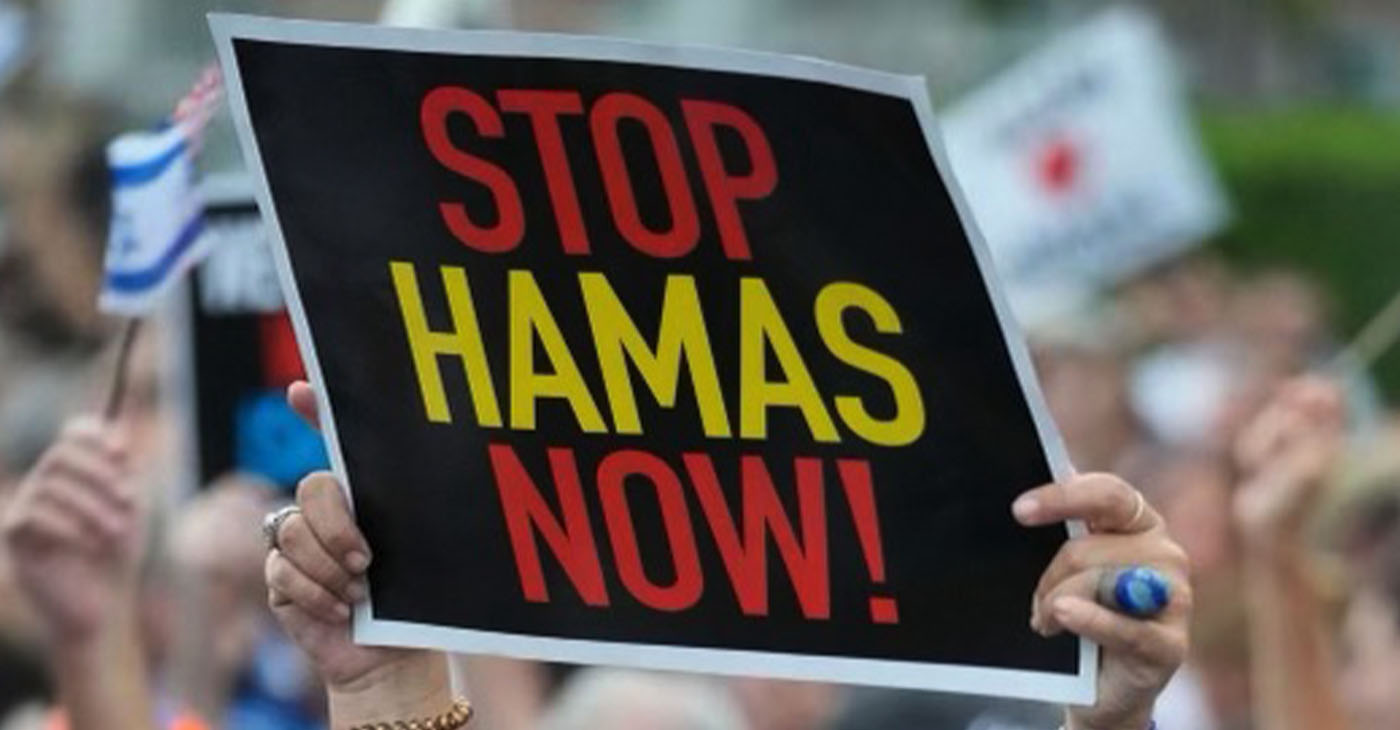
By Joe W. Bowers Jr.
California Black Media
OPINION
On Oct. 7, 2023, Hamas terrorists crossed the Israel-Gaza border and indiscriminately slaughtered Israeli civilians in their homes.
They killed nearly 300 young people at a music festival and took at least 200 hostages including 30 children. The atrocities they committed included massacres of families, abduction of the elderly and children, burning of babies and rapes of women.
The horrific surprise attack deserves universal and unequivocal condemnation. President Joe Biden called what Hamas did “an act of sheer evil” and pledged to defend the lives of Israelis and Jewish Americans.
He said, “Let there be no doubt. The United States has Israel’s back. We’ll make sure the Jewish and democratic state of Israel can defend itself today, tomorrow, as we always have.”
Hamas killed approximately 1,400 people including 32 Americans. Citizens from 40 different countries including the United Kingdom, France, Mexico, and Thailand were killed or reported missing.
Hamas fighters breached Israel’s border defenses on the final day of Sukkot while soldiers were away due to the holiday and launched attacks on 22 towns outside the Gaza Strip. This security lapse has been described as a catastrophic failure of Israel’s intelligence agencies..
Hamas is an extremist Islamist militant organization that has governed the Gaza Strip since 2007. It is recognized as an Iranian-backed terrorist group by the U.S. and the European Union and has a long history of violence against Jews and Palestinians, the latter of whom they often use as human shields.
While there have been plenty of groups who have unequivocally condemned the massacres, there are a number who haven’t, including organizations such as the Democratic Socialists of America (DSA), Black Alliance for Peace, Red Nation, and independent Black Lives Matter (BLM) chapters (excluding the national Black Lives Matter Global Network Foundation).
The DSA San Francisco chapter put out a statement on Oct. 9 that said, “Socialists support the Palestinian people’s, and all people’s, right to resist and fight for their own liberation. This weekend’s events are no different.”
Student organizations at a number of universities and colleges in California signed a solidarity statement titled “Resistance Uprising in Gaza” from Students for Justice in Palestine (SJP). The statement attributes the violence of the Hamas attack to what it refers to as Israeli apartheid and occupation.
The SJP statement written by Bears for Palestine at UC Berkeley says, “We support the resistance, we support the liberation movement, and we indisputably support the Uprising.” Essentially, these students are indirectly associating themselves with Hamas’ barbaric acts under the guise of “resistance.”
Signing the statement were 51 student organizations including those from Stanford, UC Berkeley, UCLA, UC Davis, UC San Diego, CSU Sacramento, and USC.
A statement signed by 34 Harvard student organizations said, “We, the undersigned student organizations, hold the Israeli regime entirely responsible for all unfolding violence.”
Many university leaders, where these students are enrolled, have been guilty of failing to unequivocally condemn Hamas and for inadequately addressing their students’ expressed support for Hamas.
Several Stanford faculty members, including three Nobel laureates, condemned Stanford’s administrators’ weak response to acts of terrorism and the expression of pro-Hamas sentiments by students on campus.
Israel unilaterally withdrew from Gaza in 2005. It dismantled 21 Israeli settlements in the territory and handed them over to the Palestinian Authority.
The assault by Hamas on Oct. 7 was not an ordinary clash with Israel. Hamas’ actions resulted in the deadliest single day for Jews since the Holocaust.
While there are valid reasons for protesting Israel’s treatment of Palestinians and a real reckoning with the Israeli government on its policies is long overdue, nothing justifies Hamas’ attack.
Israelis who were killed largely had nothing to do with the conditions of Palestinians in Gaza. Some of the victims weren’t even Israeli — they were just tourists.
The students blaming Israel for the atrocities committed by Hamas have faced criticism. Some groups have withdrawn their endorsements because of the backlash aimed at them. Others have doubled down on their activism. SJP held a “National Day of Resistance” on several campuses.
Several CEOs have asked Harvard to disclose a list of members from the organizations assigning responsibility to Israel to insure they do not hire any of their members. A Berkeley law professor has also urged firms not to hire his students who have publicly blamed Israel for the war.
This California Black Media report was supported in whole or in part by funding provided by the State of California, administered by the California State Library.
-

 Activism4 weeks ago
Activism4 weeks agoOakland Post: Week of March 20 – 26, 2024
-

 #NNPA BlackPress3 weeks ago
#NNPA BlackPress3 weeks agoCOMMENTARY: D.C. Crime Bill Fails to Address Root Causes of Violence and Incarceration
-

 #NNPA BlackPress4 weeks ago
#NNPA BlackPress4 weeks agoFrom Raids to Revelations: The Dark Turn in Sean ‘Diddy’ Combs’ Saga
-

 #NNPA BlackPress3 weeks ago
#NNPA BlackPress3 weeks agoMayor, City Council President React to May 31 Closing of Birmingham-Southern College
-

 #NNPA BlackPress4 weeks ago
#NNPA BlackPress4 weeks agoCOMMENTARY: Lady Day and The Lights!
-

 Activism3 weeks ago
Activism3 weeks agoOakland Post: Week of March 27 – April 2, 2024
-

 #NNPA BlackPress4 weeks ago
#NNPA BlackPress4 weeks agoBaltimore Key Bridge Catastrophe: A City’s Heartbreak and a Nation’s Alarm
-

 #NNPA BlackPress4 weeks ago
#NNPA BlackPress4 weeks agoBaltimore’s Key Bridge Struck by Ship, Collapses into Water

